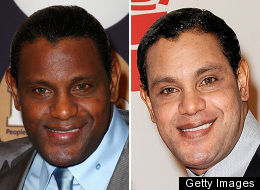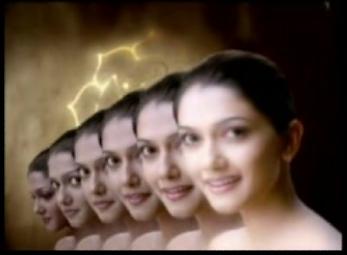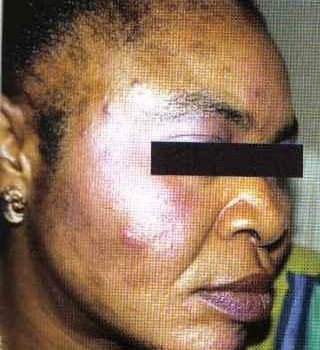
So what, some argue. Sammy Sosa wants to whiten his skin and some folks want a tan. The problem with using tanning as a counter-argument to whitening is that it is a false dichotomy. If one was to assume that skin whitening and bleaching are merely exercises in cosmetics he or she would be spot-on. But skin whitening is mainly about power, as even its defenders citing "age-old traditions" explicitly concede; by this I mean the relative power of white skin in a world still dominated economically, politically and culturally by European and American frameworks of assumption of what constitutes progress, success and beauty.
Even though both artificial and natural skin-tanning are growing in popularity in Asia and elsewhere-- mainly among the young and artistic--it is the great exception not the norm.
On a beach in Penang, Malaysia, during my reporting on this issue, I met Elena Singh, a physical therapist, who was one of two Asians taking in rays under an 85 degree sun.
Many Asian people like to be like Michael Jackson
she told me.
They can pay any amount of money to get white. For me, I would not advise that because many of the chemicals that are used for whitening contain mercury or tar. So it's not doing much goodness to the skin. I would advise people if you want to be healthy to your skin and your health, you should get some sun.
Citing fear of skin cancer, but mainly citing the fear of being dark, Singh's advice is falling on deaf ears in Asia. (Globalpost.com)
Even "Ganguro"--mainly Japanese young women who tanned recklessly to a degree where they were barely distinguishable from naturally dark-skinned people--have fallen out of favor as whitening has surged.
No, this is not a new story. What is new is that since the early 1990's, the use of skin whitening products has exploded. In Asia, Europe, and the US, at various points in history, it was just the elite and the certifiable middle-classes that could afford to maintain pearly white complexions in societies where most people toiled the land. Now both over-the-counter and illegal products are being purchased in greater numbers, especially in Asia where the middle class has grown dramatically in the last three decades.
THE CONNECTION TO JOBS
In many nations worldwide there is extraordinary societal pressure to whiten or to at least lighten one's skin. The failure to do so in societies such as Vietnam and the Dominican Republic can spell the difference between a financially stable marriage or in landing even the most basic secretarial job and other positions that interact with the public.


Some large and small businesses in Brazil, up until the past decade (when anti-discrimination laws started to be enforced), were notorious for posting classified ads seeking white, fair skinned or light skinned applicants ONLY. Simply put, in various societies, whether India, Brazil, Vietnam or the Dominican Republic, your chances of being hired in many positions are considerably better if your skin is lighter than those with whom you are competing.
There, of course, are specific cultural contexts for skin whitening. But they can not be separated from global media images (from BET to the BBC), universal stereo-types and an historical predilection for whiteness based on centuries of western influence, to put it mildly. For example, turn your channel to the "telenovelas" on Spanish speaking Univision and you would not be wrong to come away thinking that only wholesome white Latino families live south of the U.S. border.
Now the messages underlying skin whitening do not necessarily translate as what many here in the U.S. define as racism. Sometimes the terms "shade-ism" or "colorism" might better explain this world-wide phenomenon. But the effects are the same. Even in the United States--arguably a comparatively more enlightened multi-racial and self-confident society than many others--a 2006 study by the University of Georgia revealed that light skinned blacks are often more likely to be considered for jobs over dark-skinned blacks. The study found that dark-skinned blacks face "a distinct disadvantage when applying for jobs, even if they have resumes superior to lighter-skinned black applicants".
Tufts University social psychologist Keith Maddox studies public reactions to skin tone and color: "What some of the research has shown is that black skin color-- and also when you're thinking about other kinds of physical characteristics that are associated with blacks-- tend to be more associated with negative concepts, so more closely associated with fear and closely associated with negative personality traits." 
Melissa Nobles, a political scientist at MIT, says the throughout the world lighter skin, "...can connote social status and your standing in a society. And usually societies are hierarchically arranged, and blackness tends to be lower on this scale than let's say whiteness or lightness."
But you don't need to have studied political science to know this. Skin whitening and bleaching products are flying off the shelves of ethnic-oriented beauty salons and stores in the U.S. whereever Asian and Latin American immigrants live, and for that matter, in African American neighborhoods as well. The pressure to alter skin color is enormous, even for super-successful baseball players.
In Sammy Sosa's native Dominican Republic, the desire and everyday struggle to be fair is the stuff of legends. Black and light, and the right shade of light, underlie much of the societal tensions amongst the peoples of Hispaniola, with Haitians in the West and dark skinned Dominicans regarded unequivocally as less-than. So it should not be surprising that the formerly black Sammy Sousa is now a lighter version of himself.
Skin whitening has a long history in the Dominican Republic, as author Junot Diaz reminds us in "The Brief Wondrous Life of Oscar Wao", with his reference to former dictator Rafael Trujillo, "who bleached his skin, wore platform shoes, and had a fondness for Napoleon-era haberdashery."
Today, many people the world over lighten their skin also in hope of living a good life (sans the dictatorship), or at least one where they think they can compete in an undeniably color coded universe, which still exists in the age of Barack Obama.